Whenever I say that zinc is one of the most important nutrients for thyroid function, I’m always met with a response like:
“What about iodine?”
And while iodine is important (as are many others), there’s a good case to make that zinc is up there in the top 3.
Because of this, many thyroid patients often supplement with zinc.
And because I’ve been primarily helping thyroid patients for the last 6 years, I’ve seen quite a bit during that time.
One thing I know for sure:
Many thyroid patients are often taking the wrong type of zinc and the wrong form of zinc.
Even though they know that zinc is helpful for the thyroid they are missing out on its beneficial effects because they aren’t using the right type!
We aren’t here to focus on the benefits of zinc on thyroid function but they are so important that we should at least mention them.
The 5 main reasons your thyroid needs zinc include:
- It’s required for TRH (1) production – Without zinc, your TRH, TSH, T3, and T4 levels will all be low. You will be hypothyroid but your labs will look hyperthyroid to the untrained eye.
- It’s required for T4 to T3 conversion – If you don’t have enough zinc then you will have trouble creating enough T3 thyroid hormone through thyroid conversion!
- It’s required for binding of T3 to the thyroid nuclear receptor – Without zinc, your thyroid hormone will have a hard time binding to the nuclear receptor (2) in your cells which means your circulating thyroid hormone is less effective.
- Low zinc causes low thyroid symptoms – The connection between zinc and thyroid function is so strong that low levels cause reversible low thyroid symptoms.
- Low zinc inhibits T lymphocytes and immune function – Decreased immune function means that you may be at more risk for autoimmune disease.
When you realize that low thyroid function impairs zinc absorption and that hypothyroid patients are very likely to be zinc deficient, using zinc supplements becomes very appealing.
It’s been my experience that most patients with thyroid conditions do not have enough zinc and, therefore, benefit from zinc supplementation.
But before you run out to take advantage of these benefits you must be sure that you are using the right form!
If you aren’t then there’s no guarantee that you will get these benefits.
The Best Forms of Zinc for Thyroid Function
If you are ready to take your zinc to the next level then here are the forms that you want to use:
- Zinc chelate (3)
- Zinc monomethionine
- Zinc gluconate
- Zinc acetate
- Zinc citrate
Each of these is utilized and absorbed by the body equally well.
This means that their benefit on thyroid function will be equal, provided you can get them into your body correctly (more on that below!).
So what I want you to do is grab your supplement bottle and take a look at the ingredient list.
On the back, you will see all of the ingredients including zinc.
Go to the section that says zinc and look in the parentheses.
You should see something like this:

In the parentheses, you will see the FORM of zinc that you are taking.
The form of zinc refers to whatever zinc is bound to help it get into your body.
And these forms alter how easily your body can use the zinc, what it needs to get rid of when it does, and when it will be absorbed in your gastrointestinal tract.
If your formulation of zinc is not one of the forms listed above, then you will want to swap out your zinc supplement for one that contains the right form.
Avoid These Forms of Zinc
You will notice that two common forms of zinc did not make the list:
- Zinc oxide
- Zinc picolinate (4)
Zinc oxide is the cheapest form of zinc and is not as well absorbed (5) as the other forms listed above.
Zinc oxide is commonly found in cheap supplements from manufacturers that are trying to drive down the price of their supplements.
Sometimes, it’s okay to do this, but not with zinc.
So check your supplements to see if they have zinc oxide. If they do, there’s a good chance that the quality of the other ingredients in there is not ideal so you’ll want to toss it out and replace it with one of the other forms of zinc mentioned above.
But what about zinc picolinate?
My recommendation to avoid this form of zinc is a little different.
When you look at the studies of zinc picolinate, they definitely show that this formulation of zinc is well absorbed by the body.
Because of this, I used to frequently recommend zinc picolinate as my preferred form of zinc for thyroid patients.
But not anymore.
Upon taking a closer look at the studies, they show that while zinc picolinate is well absorbed, some of that zinc is eliminated from the body in the urine and through hair follicles in the very same form it was consumed as.
One way to look at this information is to view the binding of zinc to picolinic acid as something that is so strong that it prevents the body from breaking that bond and allowing it to use zinc in its elemental form.

Whether or not this occurs for sure is unclear, at least based on the current studies.
But when you have other forms of zinc that don’t have this issue and that are as equally absorbed as zinc picolinate, why take the risk?
In my experience, there is no difference between zinc picolinate and zinc citrate or zinc chelate in terms of how they get into the body and impact thyroid function.
For these reasons, I don’t recommend zinc bound to picolinic acid.
How Much Zinc Should You Take Each Day?
My recommendation is to take around 5 to 15mg of zinc per day.
Here’s why:
We know that the human body can only absorb around 7 to 10mg of zinc at any given time (6).
So taking doses higher than this range is not ideal because most of it won’t make it into your body.
The 5 to 15mg dose that I recommend puts you in the optimal range for absorption and limits the negative side effects that can be associated with zinc supplementation (more on this below).
Why, then, do supplements contain such high doses of zinc?
That part isn’t clear to me but probably because they know that not everyone will absorb the full amount in the supplement.
The creators of zinc supplements probably also assume that you will take your zinc with food (not ideal) which will further impair zinc absorption.
If, for instance, you are taking a 30mg dose of zinc with a meal, your body may only absorb some fraction of it.
Even though you started with 30mg, depending on the meal you take it with, some large portions may bind to and inhibit the full amount from getting into your body.
To combat this, they usually increase the dose.
But there’s one big problem with that:
High doses of zinc can cause indigestion, stomach problems, cramping, and even nausea (7).
This effect appears to be dose-dependent, though, and there are ways to solve this issue:
Dealing with Stomach Problems When Taking Zinc
One of the most common symptoms when taking zinc is an upset stomach!
I’ve personally experienced this side effect and can tell you that it isn’t fun.
So what can you do about it?
There are a few things you should consider:
The first is that the higher your dose of zinc the more likely it is to cause stomach indigestion.
So make sure that you are taking a dose in the 5 to 15mg range!
The second is that it’s always ideal to take zinc on an empty stomach if at all possible.
This will give your gut the best chance possible to absorb all of the zinc you are taking.
If you can’t take your zinc on an empty stomach then take it will a full glass of water.
Flooding your stomach with a big glass of water is often enough to fix indigestion.
Make sure you don’t take a ‘sip’ of water! You’re looking to get at least 8 or more ounces of water.
If that still doesn’t work then you will want to take your zinc with food.
Even though taking zinc with food isn’t ideal, it’s still better than not taking your zinc at all.
Just be sure to take zinc as far away as possible from foods such as whole grains, nuts, seeds, and legumes because they contain phytate (8) and phytate can block the absorption of zinc (9).
The Copper/Zinc Ratio
Whenever the topic of zinc supplementation comes up, the topic of the zinc:copper ratio is not far behind.
While there have been some studies that show that an imbalance in this ratio may lead to some health problems (10), these studies do not prove a causal relationship between the problems and the ratio.
In other words, the studies simply suggest that when someone has a health problem their copper:zinc ratio is out of balance.
But we have good evidence to believe that unhealthy states lead to this imbalance.
For instance, inflammation raises plasma copper and lowers plasma zinc.
And because inflammation is at the root of pretty much every chronic health condition, anyone with an inflammatory condition will end up with an imbalance in their zinc:copper ratio.
But it’s not the ratio causing the problem, it’s the inflammation.
With that in mind, focusing on the zinc-to-copper ratio when using zinc supplements is rarely required in thyroid patients.
Thyroid patients, by virtue of how thyroid hormone impacts zinc absorption, tend to result in low zinc levels.
This is why most thyroid patients can get by without worrying about their ratio.
More important than focusing on your copper level is focusing on reducing inflammation and optimizing your zinc level!
As you reduce inflammation and take zinc supplements, you should see a drop in your copper and a rise in your zinc which will bring you to the healthy and optimal levels you want to be at.
If you use a supplement such as this one, which contains both copper and zinc at the right levels, then you won’t have to worry about the ratio unless in very specific circumstances.
Your Next Steps
If you want to take full advantage of the benefits that zinc has to offer then make sure you double-check the supplements you are using.
Grab them and check the back to see what type of dose you are taking and what form of zinc you are taking.
If your zinc doesn’t meet the requirements listed above then it’s time to go looking for a new supplement!
You can take the easy path and use the ones that I recommend here which meet these criteria or you can go searching elsewhere for them.
It doesn’t matter to me where you get your zinc, just make sure you are using the right type, form, and dose!
And now I want to hear from you:
Are you using the right type of zinc?
Have you been using the wrong form?
Have you experienced any negative side effects when using zinc?
Have you noticed any benefits?
Leave your questions or comments below!
Scientific References
#1. https://pubmed.ncbi.nlm.nih.gov/30982439/
#2. https://www.jbc.org/article/S0021-9258(18)81732-X/pdf
#3. https://pubmed.ncbi.nlm.nih.gov/26507438/
#4. https://pubmed.ncbi.nlm.nih.gov/3630857/
#5. https://www.ncbi.nlm.nih.gov/pmc/articles/PMC3901420/
#6. https://www.ncbi.nlm.nih.gov/pmc/articles/PMC7146416/
#7. https://www.ncbi.nlm.nih.gov/books/NBK547698/
#8. https://www.hsph.harvard.edu/nutritionsource/anti-nutrients/
#9. https://pubmed.ncbi.nlm.nih.gov/7712343/
#10. https://pubmed.ncbi.nlm.nih.gov/25660061/
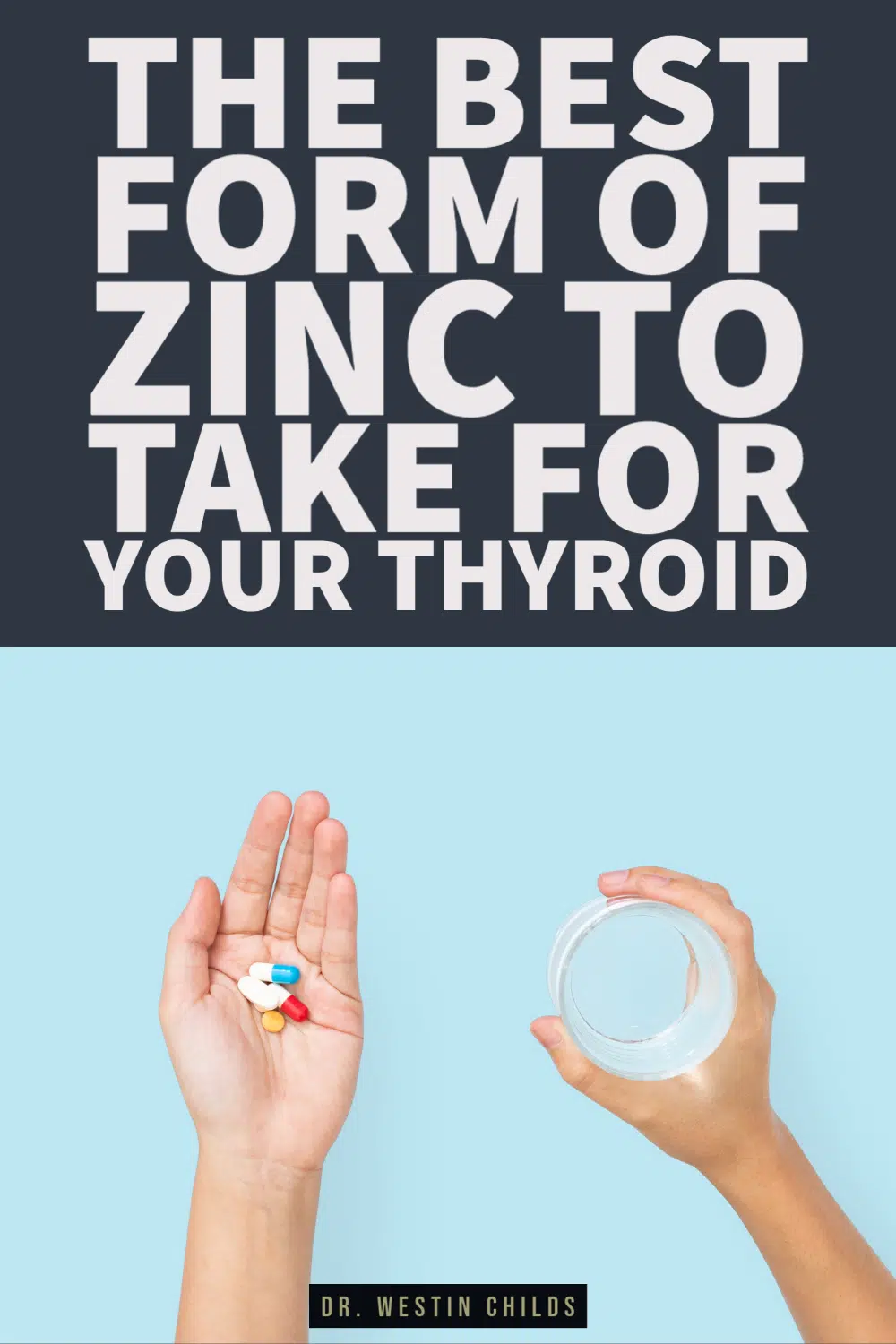
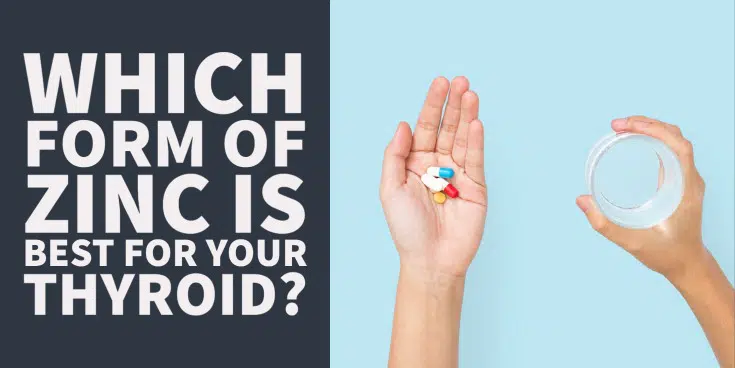


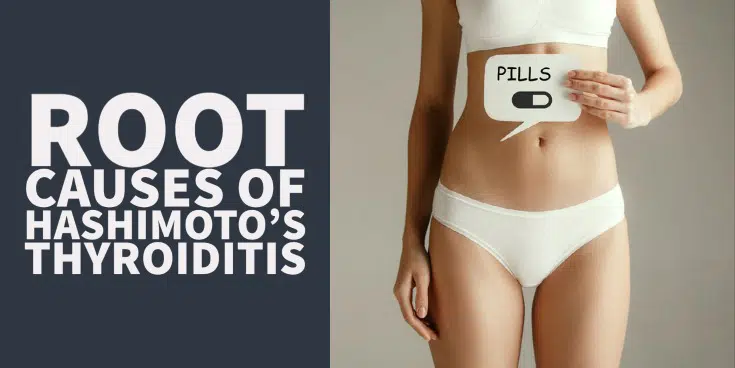
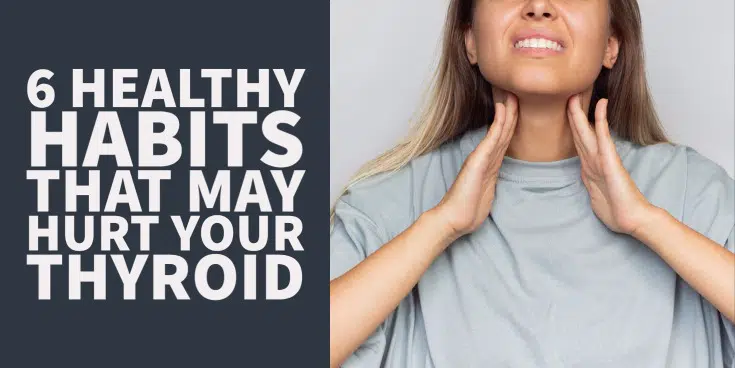
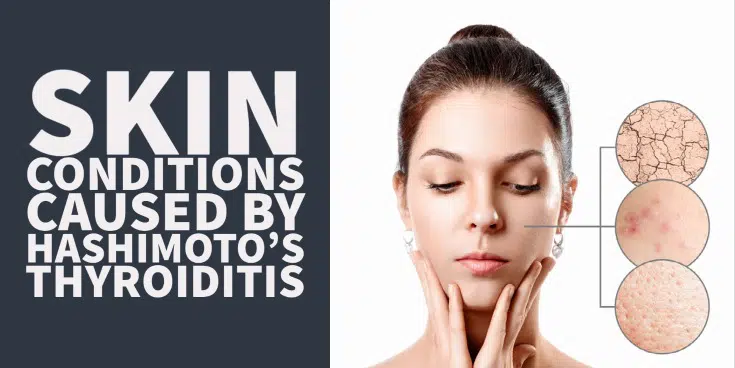
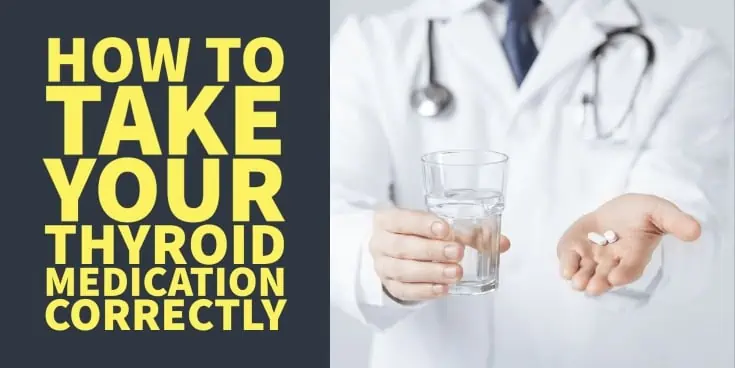
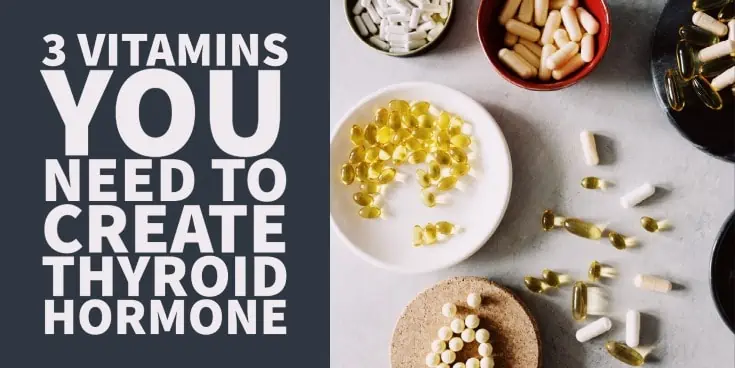

Hi Dr. Child’s;
I take compounded T4/T3 (75mcg/15mcg). I started taking this formula after being wiened from 400mcg of Synthroid a day. I was being overdosed. Now I’m gaining weight again. When I was originally diagnosed I weighed 178 pounds. After 3 years on synthroid I lost 40 pounds, but became hyperthyroid due to the dosage. My body frame can’t handle that much weight. I’ve gained back 27 pounds.
I need to find the right supplements to kick in my meds to work. My labs look great; my body says no. I do all the labs you call for; T3, T4, and TSH. T4 is low and T3 is higher. When should I take the selenium and zinc? Before my thyroid meds or at same time.
I hope you can understand what I’m asking.
Thank you,
BB
Hi Brenda,
I would recommend reading more about how I recommend taking them on this page: https://www.restartmed.com/product/t3-conversion-booster/
Hi to All,
I am without thyroid because of having graves disease for 10 yrs and on t4/t3 combined. My zinc is always low. When i take 5, 7.5 or 15 mg of zinc citrate at daytime, i get massively tired and foggy brain. When i take it at bedtime, i get heart palps. So i switched to zinc piccolinate 15 mg with evening meals and its ok for me. Wonder how my upcoming Labs will Look like…
Dr. Childs, you didn’t mention zinc orotate. What are your thoughts on this form of zinc?
Hi Star,
There’d be no reason to use zinc orotate when there are other better-studied forms available.
After reading your article about thyroid & zinc. I just started last month taking thyroid medicine & I was told by my eye doctor a few months ago to take areds by Bausch + Lomb for I was developing MAD in one eye. So I knew I knew that I was taking a lot of zinc from the eye vitamins so I looked on the bottle & sure enough it was 80 mg Zinc Oxide. So now I have to decide what I should do cause I have now have both problems. That kind & that much zinc is not really helping both problems. Right? Also I had Covid last month so I don’t know if that triggered my thyroid or mot.
Hi Janet,
It depends on the form of zinc you are taking and how you are getting it into your body. For instance, zinc for treatment of viruses tends to be better in lozenge or liquid forms.
Hi Dr. Childs,
I have recently been taking Zinc (as Zinc L-Methionine Sulfate) 15 mg and 1mg Copper (as Gluconate).
Is this type zinc similar to Monomethionine?
I’m 82 years old with low thyroid. I’m also taking meds for that.
Thank you.
Hi Geraldine,
Zinc monomethionine will sometimes be listed as zinc-l-monomethionine which I am assuming is the version you are taking. I’m not 100% sure since I am not looking at it but I would think it’s probably the same based on the information provided here.
So you do not recommend zinc bisglycinate?
Hi Mimi,
Zinc bis-glycinate chelate is listed first on the approved list and would count under zinc chelate so it’s a great version to use. It’s a highly absorbable formulation of zinc that I use in many of my supplements.
Dr. Childs,
I use zinc L-carnosine for my gut – 15 mg of Doctor’s Best brand at night before bed. My bone formula has just 3.3 mg of zinc L-methionine sulfate. Are either of these meeting my zinc needs? I’m on NP Thyroid. Thank you so much.
Hi Lori,
Zinc carnosine tends to be better for treating GI-related issues. Some of it likely does get absorbed but if you are trying to get it into your body for systemic purposes then there are better options out there. If you are using it for treating something like h. pylori or something similar then you can use it until you no longer have that issue at which point you can switch to one of the formulations listed in this article.
Hello!
Thank you for your information.
You recommend 5 – 15 mg of Zinc and you say to take on an empty stomach, however, your link to your own supplement says to take with a meal, so I’m confused on this.
Help! Thanks!
https://www.restartmed.com/product/thyroid-daily-essentials-thyroid-multivitamin/
Hi Leona,
Thyroid Daily Essentials contains 31 other ingredients that can potentially be hard on the stomach but it can still be taken on an empty stomach and many people do just that 🙂 I list that as the recommended way to take it to avoid people experiencing GI upset but both options work (with or without food).
The information in this article also states that it’s fine to take zinc with food just that taking it without food is better for absorption purposes. But when it comes down to it, it’s better to take zinc with food than not at all even though you are probably limiting absorption slightly.
Your supplement has 50mg per serving. Why so much more than your recommendation of 5-15mg?
Hi Kathy,
Are you talking about Thyroid Daily Essentials? It has 12.5mg of zinc as zinc bisglycinate chelate (the most bioavailable form of zinc), not 50mg.
You can get away with higher doses of zinc in supplements that contain additional ingredients because there will be some competition for absorption. Lower doses are fine if you are taking a dedicated zinc supplement because nothing else is competing for absorption. Hope this clarifies!
Oops, thank you. I was multiplying by 4 instead of realizing the 12.5mg is “per serving.” “Thyroid Daily” looks like a great supplement.
Hi Kathy,
No problem and happy to clarify!
Have been taking “Ionic Zinc” dropper form, serving 2 – 1/2 droppers (Zinc Gluconate, Zinc Ascorbate, Ascorbic Acid, Calcium Carbonate, Stevia and Potassium Sorbate.
Aspiring to regulate heal small cyst and underactive thyroid. Any suggestions would be received with much appreciation.
Hi Maria,
Thyroid cysts are not very responsive to supplements but low thyroid symptoms can be. In terms of supplements, here’s what you’d want to look at: https://www.restartmed.com/product/hypothyroid-bundle/
what about zinc sulfate?
Hi Ann,
Here are the best versions:
Zinc chelate
Zinc monomethionine
Zinc gluconate
Zinc acetate
Zinc citrate
If your version isn’t on the list then you may want to consider getting one listed above.
Been taking liquid Pico Zinc ( lactate). Thoughts on that kind please. Liquids are better for me.
Thanks.
Dorthe Rahme
Hi Dorthe,
In general, liquid versions of zinc and or zinc lozenges tend to be better for the upper respiratory tract and not as ideal for systemic purposes. Some of that zinc will still probably make it into your system so it just depends on what you are trying to take it for. Those types of zinc tend to be better for boosting the immune system and treating things like upper respiratory infections, sore throats, the flu, etc.
You can still use a liquid version of zinc if you’d like, just keep that in mind and stick to the versions listed in the article.
I have heard/read that taking zinc with quercetin also helps absorption. Any thoughts on this?
Hi Carly,
Quercetin has anti-inflammatory properties and can benefit the immune system but I’m unaware of any benefit that it may provide to zinc absorption. If you have any studies that suggest this please let me know and I would be happy to take a look at them.
There is no mention of Zinc Sulphate. How good is that?
Hi Anuja,
Zinc sulfate does not make the list and would not be an approved form. If you don’t see your version on the list, better options are available.
Are they listed (the different forms) in order of effectiveness; or do you have to take all of them.
Hi Billie Jean,
They are not listed in order of effectiveness, just the best ones based on my research and experience in no particular order. You would only need to use one version (not all).
Hi Dr. Childs
If I am not mistaken, the single reference you use for the importance of zinc to thyroid hormone metabolism is by Dilina do Nascimento Marreiro. The paper you cite is not open access, but the following by the same author is.
“Relation Between Zinc and Thyroid Hormones in Humans: a Systematic Review” (https://doi.org/10.1007/s12011-020-02562-5)
What you quote can be found in the introduction:
“This micronutrient participates in the synthesis of the thyrotropin-releasing hormone (TRH) in the hypothalamus and of the thyrotropin or thyroid-stimulating hormone (TSH) in the pituitary gland. Zinc also acts as an essential transcription factor for the gene expression of the proteins involved in the production of the thyroid hormones, and it acts as a cofactor for type I and II deiodinases, contributing to the activation of the thyroid hormones by converting T4 to T3. Zinc is also a structural component of the T3 receptors [5–10].”
However, the references cited in this review paper DO NOT show research data directly to demonstrate:
1. Synthesis of TRH and TSH is zinc related.
2. DIO1 & DIO2 use zinc as a cofactor.
Zinc is a structural component of the thyroid hormone receptors, that is firm.
https://www.uniprot.org/uniprot/P10827
https://www.uniprot.org/uniprot/P10828
DIO1/2/3 are seleno-proteins, that is also well established. But evidence of zinc as a cofactor for DIO1/2 is so far absent on my radar.
It would be helpful if you could dig deeper, search and cite more direct references.
Hi Ivy,
Thanks for the suggestion. The point of this article is more about the best form of zinc and not the benefits of zinc on thyroid function. I’ll dig into the research on how zinc impacts thyroid function a bit deeper at some point in the future but I have a lot of other topics that I’d like to write about for now.
I found a supplement that has zinc aspartate would that work, it also has iodine and selenium.
Hi Denise,
I believe it may be a form of zinc chelate but I’m not 100% positive.
My supplement says the zinc is from a organic whole food blend, iodine from organic kelp and selenium also from an organic whole food blend would this be a good supplement to continue taking.
Hi Denise,
With few exceptions, nutrients from whole food sources are typically very good.
Hi, my cortisol and acth is high. But I was stressed and had anxiety when did the blood work. Also it showed subclinical hypothyroidism (a bit high tsh 5.8). Never had thyroid issues. But I now have chronic fatigue and crash pretty bad. I want to start very low dose iodine since I don’t consume anything with it. Should I start 15mg zinc first before iodine?? I worry of copper. I already started 2 Brazil nuts daily for the selenium. Thank you
Hi Tiffany,
I find it’s better to consume all of the nutrients that your thyroid needs in one (including iodine): https://www.restartmed.com/product/thyroid-daily-essentials-thyroid-multivitamin/
I would also look into supporting your adrenals: https://www.restartmed.com/product/thyroid-adrenal-reset-complex/
I also typically don’t recommend getting selenium from brazil nuts because the dose can vary so much between each nut, where they were sourced, their size, etc.
You are certainly welcome to do whatever you’d like, though, if you have some specific preference. I’m just letting you know what seems to work best based on my experience.
Hi Dr Childs.
Love reading your articles – I always learn something new.
My blood tests show below range Zinc. In range but low iodine too. No wonder I have a sluggish thyroid! Low T3 and low FT3. Not on medication (yet).
Major symptoms is prolonged hair shedding (been 2 years non stop).
I think low Zinc caused the low thyroid. However everytime I supplement Zinc at 7-15mg the shedding is even more extreme and doesn’t stop. I get to 3 week mark and give up as the hair loss is so scary. I’ve tried 2 different versions. Citrate and Zinc Raw (made with wholefood ingredients). I take selenium, copper and iodine too RDA’s.
I’ve followed your suggestions, but this doesn’t make sense from reading your articles, have you ever come across this scenario?
Hi Hina,
I have not seen that exact situation but it’s hard to know for sure because I typically would have a lot more information.
Between zinc citrate and zinc glycinate, which is the best when using it for immune system and overall health? For fighting covid, etc.?
I went to vitamin shoppe and they have a 15mg plant based zinc which show back label as zinc (from organic food blend) and 450mg organic food blend. Or they have 10mg zinc (as soy amino acid chelate).
Hello Dr. Childs!
Thank you for trying helping people in the need of good information about their symptoms!
I have Overactive Thyroid/ Hyper and Multimodule / Goiters.
Can I take Zinc supplement or not ?
I don’t have Hypothyroidism. I don’t have Grave disease.
Also can I take selenium nuts since I have Overactive ?
Thank you so much!
God Bless you!
Hi Rita,
Zinc can be taken in cases of hyperthyroidism.
Like you state, most zinc supplements contain a high dose.
My zinc gluconate by Jamieson has 50 mg.
I cut it into four pieces and take one piece at night. Is it okay to cut the tablet?
Hi Cher,
You’ll need to reach out to the manufacturers to confirm.
Hi Dr. Childs,
I’m a 50 year old male who has been on Synthroid or some form since I was a toddler. My folks were told that I was missing some sort of enzyme (I think) as my neck was swelling a bit – assuming some sort of goiter. Anyway, I’ve been able to manage it most of my life, but have dealt with fatigue and of course mood. Lately the fatigue has become worse. Working out is super tough and exhausting. I want to say I get some zinc (citrate) in my multi but wasn’t sure if there’s something more specific I could try to support along with the 125mcg of Synthroid I take. Thanks for the help!
Hi James,
You can certainly improve your situation with a few additions, including:
– Testosterone (likely)
– Liothyronine (Definitely)
– T2 (definition)
– And some basic thyroid support supplements
I’d start with these first and see how you feel.